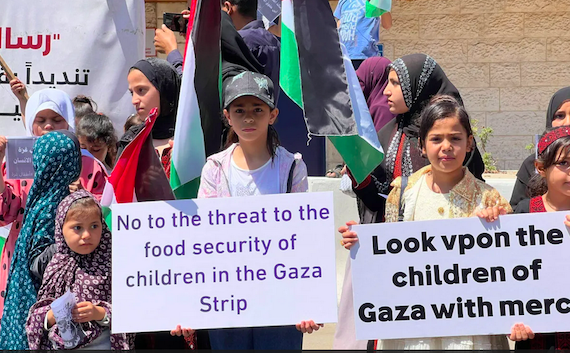( Middle East Monitor) – Dozens of Palestinian children rallied on Tuesday morning in front of the United Nations Development Program (UNDP) headquarters in Gaza City to protest against the halt and suspension of the World Food Program (WFP) in the besieged Gaza Strip. The protesters called on the head of the UNDP to reverse the decision, holding the UNDP responsible for the struggles Palestinians will now face without this aid.
This week, some families who have benefitted from the programme received a message that their monthly food voucher from the WFP would be halted. Samah Azzam, 55, a mother of six, says the decision is disastrous for her family. Samah’s husband suffers from a chronic illness and two of her sons and a daughter are studying at university. The family has relied on the WFP distribution for years.
“The food voucher just covered our basic needs,” she explains. “Now the burden will be a mountain on us and I feel lost.”
The Gaza Ministry of Social Development said the WFP’s announcement that it intends to suspend most of its services in the Palestinian territories, including the Gaza Strip, came as a surprise as there had been no prior talk of this. Reasons behind the decision, it added, remain vague and it is a breach of the agreements made with local partners.
Only two months ago, the WFP increased the value of cash assistance to 42 shekels ($11) per person due to the global increase in commodity prices as a result of Russia’s war on Ukraine.
![Children in Gaza protest outside the UN High Commissioner's headquarters against the reduction in UN food aid allocated to the Strip on 6 June 2023 [Mohammed Asad/Middle East Monitor]](https://i0.wp.com/www.middleeastmonitor.com/wp-content/uploads/2023/06/1-7-scaled.jpg?resize=1200%2C800&quality=85&strip=all&zoom=1&ssl=1)
Children in Gaza protest outside the UN High Commissioner’s headquarters against the reduction in UN food aid allocated to the Strip on 6 June 2023 [Mohammed Asad/Middle East Monitor]
According to the ministry, the WFP pumps about $2,257,108 into Gaza’s economy each month. The suspension in assistance to approximately 42 per cent of beneficiaries will hit the local economy and cost $945,945 in losses.
Not only would some 200,000 Palestinians in Gaza lose out by not receiving the WFP aid, such a move would also see aid workers lose their jobs, compounding the already dire financial situation Palestinians in the Strip live under and could lead to an increase in the unemployment rate, which already stands at over 43 per cent according to World Bank figures from 2022. Poverty rates – which currently stand at 60 per cent – will also increase, the ministry warned.
The 200 market stall holders and shopkeepers where the WFP vouchers are spent described the UN body’s decision as catastrophic. Gaza shop owner Mohammed Ali says: “We will be engulfed with an accumulation of debts.”
According to Ali: “WFP agreements require the availability of foodstuffs for a period of 3-6 months and sometimes for a full year. So we always purchase in advance due to the precarious conditions that we are living in.”
Analysts have warned that the reduction in aid will damage family dynamics and could also lead to a rise in cases of domestic violence, exploitation, the school dropout rate and mental illness. There are also concerns about the deterioration of the health of families who need permanent medical treatment.
As a result of Israel’s stifling 17-year siege on Gaza, approximately 80 per cent of Palestinians in the Strip depend on international aid. The Food Aid Program, funded by UNRWA, supports 220,000 refugee families, while the WFP-funded Purchase Vouchers Program, helps 46,000 families (some 230,000 non-refugee citizens); both are being halted, leaving nearly a million Palestinians in need of support.
Most organsiations who provide aid to Gaza do so with difficulty and are often hindered by the Israeli occupation. According to Palestinian political analyst Wael Na’ami, the Israeli authorities “interfere in some assistance programmes to leverage pressure on the Palestinian people to crack down on the resistance in Gaza and the West Bank.”
“They can put pressure on some donor countries to stop sending aid,” he continues. “The financial crisis that the UN faces is a political issue, as these funds were set to silence refugees from continuing their call for their rights.” Na’ami adds. This, he says, isn’t simply their right to return to the land they were forced out of in 1948 to make way for the creation of the state of Israel, but also to accessing the sizeable reservoirs of oil and natural gas in the Mediterranean, which could completely alter life in Gaza and allow Palestinians not only to meet their energy needs but also to export these valuable commodities and build their economy.
The views expressed in this article belong to the author and do not necessarily reflect the editorial policy of Middle East Monitor or Informed Comment.
 This work by Middle East Monitor is licensed under a Creative Commons Attribution-NonCommercial-ShareAlike 4.0 International License.
This work by Middle East Monitor is licensed under a Creative Commons Attribution-NonCommercial-ShareAlike 4.0 International License.


 © 2025 All Rights Reserved
© 2025 All Rights Reserved